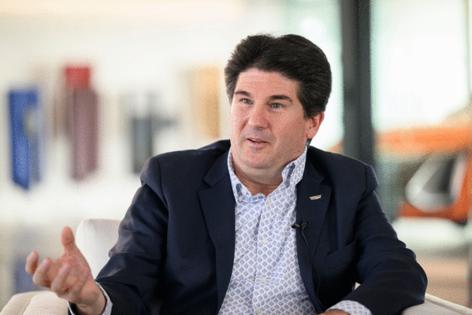Cadillac VP responds to elimination of $7,500 federal EV tax credit
Published in Business News
Cadillac will need to "make adjustments" in response to President Donald Trump signing the One Big Beautiful Bill Act eliminating an up-to-$7,500 tax credit for electrified vehicles, the luxury brand's global vice president said Thursday.
After Sept. 30, the tax credit no longer will be available. The budget cut comes as John Roth said the brand this year comes to the "epicenter" of its strategy that dates to 2015, particularly around its dealer body, marketing and products. That includes 10 launches in the past year — most of which are all-electric.
"We'll have adjustments we need to make," Roth said. "We make adjustments on a regular basis around the business. You can never stick your head in the sand. Hope is not a strategy. You've got to continue to work for business."
He said he expects consumers will move up purchases in anticipation of the tax credit's end, including in the luxury segment, but he declined to go into specifics around profitability of EVs, future incentive offers, leasing rates, product plans and whether General Motors Co. would move production of the Optiq SUV in Mexico to the United States because of tariffs. Roth, however, emphasized the U.S. manufacturing footprint GM has and that more Cadillacs are built in the United States than vehicles from any other luxury brand. The impact of tariffs has been "very limited," he said.
"If anything, it's been an opportunity for us," Roth continued.
Cadillac had its best first half of the year in nearly 20 years, and retail sales were up 19% through the first six months of 2025. U.S. sales grew 15% year-over-year in the second quarter for a 12th consecutive quarter of growth. EVs accounted for 27% of second-quarter sales, including a 31% decrease in Lyriq deliveries. Roth said options in the smaller Optiq and three-row Vistiq on either side of the Lyriq could be drawing some buyers from that nameplate.
Cadillac may be more insulated than some other brands from the removal of the tax credit, which does have limits for household income and vehicle price. The starting $127,700 Escalade IQ doesn't qualify under the $80,000 SUV threshold. Vistiq starts at $77,395, Lyriq at $58,595 and Optiq at $52,895, according to the brand's website.
Cadillac probably has some wiggle for price adjustments, but it probably won't account for the full $7,500 the federal government provided, said Sam Abuelsamid, vice president of market research at auto communications agency Telemetry.
"That might be adding more equipment, trims or features at existing sticker prices," he said, "or offering lower-cost options that take advantage of, at least, the beginnings of the economies of scale because of the shared components across their (GM's) current generation EVs."
Roth said Cadillac is "well-positioned" to take advantage of the tax credits for the remainder of their existence, and the brand will reevaluate closer to the fall. He noted a distinction in mass-market EV demand from that in the luxury market.
"There are EV buyers in the marketplace, regardless of what programs are out there from a governmental standpoint," Roth said. "We haven't seen any slowdown in our growth. Our EVs are up 51% year-on-year, over 50% growth. And, as you look at the month of June, we were running 31%. Calendar year-to-do, we're running 24% of our sales were EVs. ... That's why I have pretty high confidence going into the balance of this year and into the next and beyond."
Much of that growth has been because Cadillac has added new vehicles, however, Abuelsamid said. Still, some luxury brands have experienced declining EV sales. Mercedes-Benz Cars posted a 24% global decline in all-electric sales in the second quarter. Most of Audi's lineup decreased. Tesla's global sales fell 14% in the April-through-June period.
"Cadillac and BMW have been a little bit of the outliers holding up the bar for premium EVs," Abuelsamid said. "The rest of the market has bene kind of mixed."
Roth emphasized Cadillac's conquest rate of 56% from brands like Tesla, Mercedes, Audi and Lexus. Lyriq's is closer to 80%, he said. Vistiq and Escalade IQ also are luring younger buyers, he said, of around 47 or 48 years of age. The brand additionally has slimmed its retail footprint, especially in response to the EV transition, to 567 U.S. dealers, including about 200 standalone stores.
Racing, including Cadillac's entry into Formula 1 and a strong showing at the 24 Hours of Le Mans, is a global play, Roth added. The brand has reentered Europe with direct-to-consumer sales showing "really good growth," he said.
In China, the world's largest all-electric market, GM underwent restructuring last year. That makes Roth "optimistic" moving forward there, even as intense competition has created price pressure in the market.
"Cadillac wants to be on the global stage," Abuelsamid said. "The U.S. is hesitating on EVs. The rest of the world is not. It has to continue to move on with the EV transition."
©2025 www.detroitnews.com. Visit at detroitnews.com. Distributed by Tribune Content Agency, LLC.












Comments